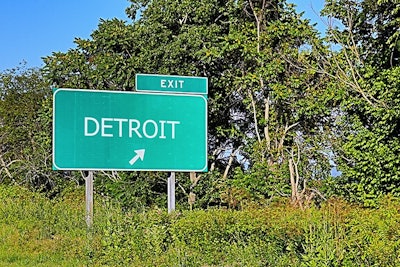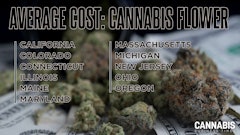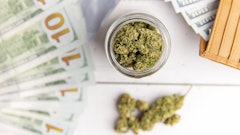
A second lawsuit has been filed to challenge Detroit’s revised adult-use cannabis ordinance, which City Council members approved in April.
Medical cannabis company JARS Cannabis filed the lawsuit in Wayne County Circuit Court June 3, arguing that the ordinance violates Michigan law, according to the Detroit Free Press.
JARS, which operates two medical cannabis dispensaries in Detroit and other medical and adult-use dispensaries elsewhere in Michigan, is asking the court to block the city from moving ahead with its ordinance, the news outlet reported.
“Detroit has created a schematic to give preferential treatment to its residents, violate MRTMA (the state's legal and regulatory framework for legally growing and selling recreational marijuana) and eradicate existing operators,” the lawsuit alleges, according to the Detroit Free Press.
Michigan launched adult-use cannabis sales in December 2019. Detroit City Council’s approval of a revised adult-use ordinance in April came nearly 10 months after U.S. District Judge Bernard Friedman issued a 19-page injunction to block the city’s previous attempt to license adult-use cannabis dispensaries within its jurisdiction.
The original ordinance would have allowed entrepreneurs to obtain “Detroit Legacy” status when applying for adult-use licenses, providing an advantage to applicants who have lived in the city for a certain number of years. The legacy provision would have also provided licensing preference to those with low incomes and those convicted of past cannabis-related crimes.
Detroit’s revised ordinance provides separate processes for residents and non-residents to receive licenses to ensure that the two types of applicants do not compete against each other in the licensing process.
The ordinance makes 100 cannabis retail licenses available, and mandates that half must be issued to social equity applicants. It also creates licenses for consumption lounges and microbusinesses.
Last month, a group of medical dispensaries in Detroit—House of Dank, Herbal Wellness, TJM Enterprises Services and Detroit Natural Selections Enterprises—filed a lawsuit, also in Wayne County Circuit Court, to challenge the revised ordinance.
The plaintiffs in that case take aim at a provision in the ordinance that bars medical cannabis operators from receiving adult-use licenses until 2027, as well as a provision that prohibits cannabis dispensary owners from having ownership interest in more than one retail license. They claim that Detroit’s medical businesses will likely close down due to lack of sales by the time the city opens the adult-use program to medical operators, and they are asking the court to block the city from prohibiting dispensaries that sell both medical and adult-use cannabis.
A status conference on that case is scheduled for Aug. 10, according to the Detroit Free Press.
In the new lawsuit filed by JARS, the company alleges that the ordinance violates state law in several ways, the news outlet reported.
JARS claims that Detroit’s scoring system for the applications does not provide a competitive application process, according to the news outlet, and that it instead awards points to applicants that are unrelated to applicants’ ability to operate in compliance with state law. For example, JARS points to the ordinance’s “Good Neighbor Plan,” which awards points to applicants for hiring Detroit residents and donating to a charitable organization in the city, according to the Detroit Free Press.
JARS argues that state law mandates that “a municipality may adopt other ordinances that are not unreasonably impracticable and do not conflict with this act or any rule promulgated pursuant to this act,” according to the news outlet, but that Detroit’s ordinance is “unreasonably impracticable” because the scoring method deters the company from applying.
JARS also alleges that the ordinance violates state law because it prohibits the issuance of more than one adult-use license to any direct or indirect owner, the Detroit Free Press reported, as well as bans the co-location of medical and adult-use cannabis operations.
“We believe the city council's latest attempt at an ordinance clearly violates state law, which hurts not just Detroit dispensary owners and investors, but also the employees that rely on these businesses to provide for their families,” Scott Roberts, whose law firm represents JARS in the case, told the news outlet.
Detroit began accepting applications for some types of adult-use cannabis businesses April 20, but city officials are still working on creating a system to start processing the applications, the Detroit Free Press reported.























